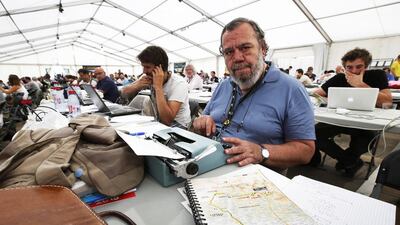Ashes fall from his cigarette as his puffy fingers play a distinctive staccato on a 38-year-old Lettera 32 typewriter.
Gianni Mura, who covered his first Tour de France in 1967 for La Gazzetta dello Sport, is an iconic figure in the race press room. In its memory, too.
The Italian, 68, now works for La Repubblica, and almost 50 years after following his first Tour de France – the event when Tom Simpson died, he recalls – Mura has not changed a bit.
He still dictates his stories to the newspaper after having typed them, usually just outside the media room, cigarette hanging from his lower lip.
“Sometimes, Japanese reporters come to me asking if I’m not afraid of bothering people with the sound of my typewriting,” he says.
“I reply that it is their silence that bothers me.”
Mura, who is above all a respected football journalist in Italy, has witnessed the changes in cycling, “the toughest sport there is ... Essential things have changed, especially in our jobs.
“We were named suiveurs [followers] because we were literally following the race. We would drive right behind the breakaway riders.
“We were inside the race. Now we’re more preceders of the race.”
Journalists reporting on the modern Tour de France are rarely allowed near the peloton, which has grown much bigger.
Mura longs for the years when riders would take risks and reinvent the race every day.
Only Spain’s Alberto Contador has his favours for his all-in approach to cycle racing.
“That’s what I’m looking for. But when I see a rider with earpieces, I think of the Badger,” he said of five-time winner Bernard Hinault. “He would have been furious.
“We were also much closer to the riders. In the evening, we would have dinner with them.
“We would interview the riders in their rooms. I once interviewed Raymond Poulidor while he was in his bath, in which he would put a bit of vinegar.”
But in the 1990s, cycling dived into the EPO era and the atmosphere changed.
“Access to the hotels was forbidden to reporters, because of what was happening behind the doors,” Mura said.
“He has poetic idea of cycling,” says Philippe Brunel, a veteran reporter from L’Equipe whose spindly figure is in sharp contrast to Mura’s gargantuan stature.
“He has always been looking for the same thing on the Tour, and it’s not just the race, it’s the human angle. Because, after all, the Tour will always just be riders on a bike.”
His wife is cuisine correspondent for La Repubblica, so Mura travels around France with a food guide in his pocket.
And so he declines an invitation to one of the best restaurants in the Pyrenees, “because, where is the risk? I know it already.
“I’m looking to report on what I find along the road. Today, I also write about Luzenac, a [football] team who were promoted to Ligue 2 but then denied promotion because of a financial problem.
“I wanted to tell the story of that village of 500.”
As Mura points out, the Tour de France is much more than a cycling race, even if it is the biggest in the world.
“I am fascinated by the Tour de France mainly because it is in France. Its songs, cuisine recipes, it’s the story of terroirs [the land],” he said.
“It’s something I don’t find anywhere else. It reverberates with the past.
“But that’s an old geezer talking.”
This year’s race has been one that Mura has enjoyed covering.
“I can say I have seen fabulous, dramatic Tours, with fighters. There were a lot of stories to tell. But I have to say this edition is a very good one,” he said.
“There have been crashes, there has been a lot of action – something happens almost every day.”
As Mura prepares to resume his typewriting concerto before calling the office to dictate his story, would anyone dare tell him he must use a computer like everyone else?
“Listen, I’m not a small car that you can park anywhere,” he said. “I’m an old truck, with its habits. And my career has earned me this privilege.”
Follow us on Twitter @SprtNationalUAE

